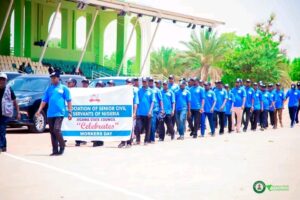The Jigawa State Government says it has injected nearly N7 billion into the state’s contributory pension program to save it from collapse, following years of mass retirements and halted civil service recruiting.
Governor Umar Namadi made the announcement during the 2025 Workers’ Day ceremony in Dutse, where he also revealed a new N70,000 minimum salary and ongoing public-sector reforms.
Governor Umar Namadi also complimented Jigawa’s workforce for their perseverance and dedication, referring to civil servants as the foundation of the state’s growth.
He spoke at the Aminu Kano Triangle in Dutse, during a rally marking this year’s Workers’ Day.












The governor said his administration inherited a pension scheme on the brink of collapse but has since injected over N7 billion to stabilise it.
Read Also
According to him, the move is part of a wider reform effort to restore confidence in the system and secure the future of retirees.
Namadi also highlighted the introduction of a N70,000 minimum wage, the highest ever in the state’s history designed to ease the burden of economic hardship and improve workers’ living standards.
Other initiatives include mass recruitment in education and healthcare, subsidised agricultural loans for workers, the establishment of palliative shops, and the rollout of e-governance training for civil servants to boost efficiency and service delivery.
In his address, the Chairman of the Nigeria Labour Congress (NLC) in Jigawa State, Comrade Sunusi Alhassan Maigatari, acknowledged the government’s efforts, describing Governor Namadi as “both labour-friendly and a governor of the people.”
He commended the administration’s 12-point agenda, which he said has delivered visible results particularly in job creation, welfare initiatives, and targeted relief measures for workers during tough economic times.
The governor also responded to fresh demands from organised labour, including expanded recruitment, a review of senior officials’ salaries, and improved career progression for nurses and midwives.
He assured workers that these concerns would be addressed within the limits of available resources and the law.





